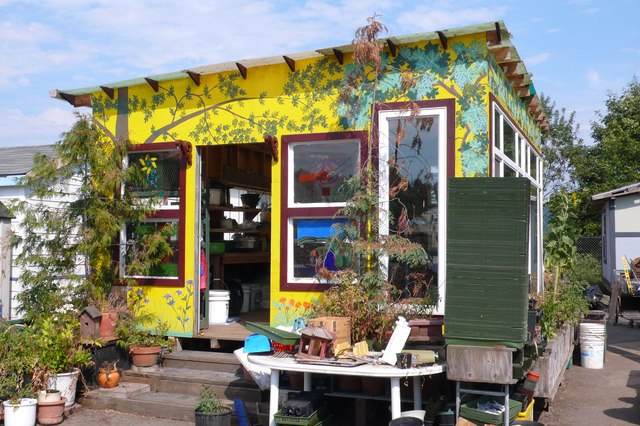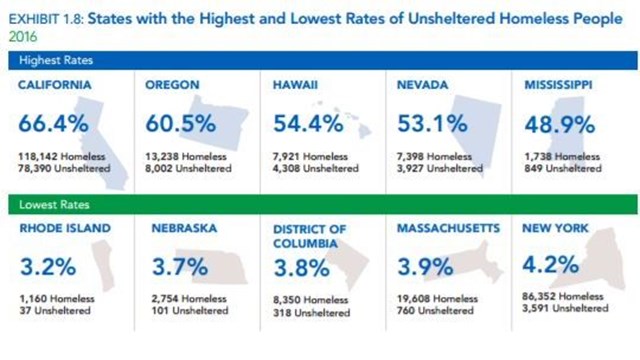In Oregon, Tiny Homes Are The Answer To Homelessness
Share
I think just about everyone has heard of the tiny home movement at this point. Tiny homes are small, often mobile homes that feature between 150 and 500 square feet of living space. They're an answer to a prevailing culture where bigger is better, except maybe to your wallet. The state of Oregon thinks they're also an answer to the broader issue of homelessness.
On any given day, more than 13,000 Oregonians are homeless and 8,000 of them sleep without shelter. According to a report released earlier this month by the United States Department of Housing and Urban Development, that makes Oregon the second worst in the country for providing shelter to the homeless.
California ranks as #1, with 78,000 people unsheltered each night.
In Oregon, living an unsheltered life can be particularly brutal, especially in the winter. Night time temperatures can drop below freezing from November through March and rain in the Pacific Northwest is often persistent and torrential.
Tiny home advocates are taking action throughout the state, providing shelter to the homeless through tiny homes. In Portland, the movement manifested as Dignity Village, a tiny home community established in 2000.
Dignity Village began as a tent city called Camp Dignity. It wasn't simply a place for the homeless to camp and feel safe, but it was also a protest of bans that had been passed on homeless encampments. After a year, the city agreed to sanction a campsite on city-owned property six miles west of the Portland Airport.
The village remains on that site to this day. Dignity Village is now a 501c3 charitable non profit organization. Its "board of directors" is democratically elected by residents of the village, and the board is fully staffed by members of the village.

The village is able to provide food, housing, functioning restrooms, and a mailing address for 60 adults, whose monthly rent is just $35.
The community isn't big on rules, but there are 5: no theft, no violence, no alcohol or drugs allowed within a block of the village, no persistent disruptive behavior, and you have to commit to 10 hours of community service a week.
A two hour drive south on the Interstate 5 from Portland lands you in the mid-sized college town of Eugene, Oregon. In Eugene, the story is the same: there are no homeless shelters, though a local nonprofit, St. Vincent de Paul, facilitates a series of warming centers, dubbed Egan Warming Centers after Major Thomas Egan, a Korean war veteran who died as a result of homelessness.
In December of 2011, the Eugene City Council adopted a motion asking then-mayor Kitty Piercy to form a task force to develop recommendations that would address the needs of the unhoused. The mayor appointed a 58-member Opportunity Eugene Community Task Force on Homeless Solution, which included community members, city councilors, neighborhood associations, local businesses, and even representatives from the local Occupy Eugene group.
Birthed from that task force was Opportunity Village Eugene, a 501c3 non-profit organization that set out to build a series of tiny homes for the unhoused. Now called Square One Villages, the organization has established one village and currently has two more under construction.
Opportunity Village doesn't reflect the fanciness you see with many chic, urban tiny homes. They're actually quite bare bones. Each is about 60 square feet and lacks running water and electricity. Some residents have small solar panel charging devices that they can use to power things like cell phones and lamps. But even though it's bare bones, the impact is huge for its residents.

The goal of Square One Villages isn't to permanently house the unhoused, but instead to serve as a stepping stone into more traditional housing.
"After only a few months of living there my girlfriend and I now are living a life where we are able to sustain a home on our own after being homeless for 2 years." says Sam Johns on the organization's website.
Given the success and the outpouring of support for Opportunity Village, two more villages are in the works. One, also located in Eugene, is called Emerald Village. Another is planned for Cottage Grove, a small community just south of Eugene, called Cottage Village.
Tiny homes are perfect for families who want to turn their backs on the big house movement, save money, and live a simpler life, but it's not all about eco-chic living. Tiny homes can also serve as a stepping stone for individuals and families which have become unhoused.
In states like Oregon, and throughout the world, it is an important step forward.
The post In Oregon, Tiny Homes Are The Answer To Homelessness appeared first on tentree.